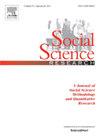在美国 COVID-19 期间,福音派反对面膜任务的立场背后的政治和教育动态。
IF 3.2
2区 社会学
Q1 SOCIOLOGY
引用次数: 0
摘要
本研究利用 2020 年 9 月至 2021 年 6 月期间进行的三次全国代表性调查,探讨了保守政治意识形态对美国 COVID-19 期间福音派身份与反对面具授权态度之间关系的中介效应。我们采用调节中介分析来考察从福音派身份到政治保守性再到反对面具授权态度的路径,以及受教育年限和政治意识形态之间的交互效应。我们使用逻辑回归模型来研究中介分析中的每条路径。结果表明,在控制社会人口背景的情况下,自我认同的福音派身份会积极推动对面具强制规定的抵制。其他研究结果证实,政治倾向不仅是现有研究中发现的公众两极化支持面具的既定预测因素,也是福音派身份积极预测反面具态度的关键机制。最后,受教育程度越高,大流行病期间公众对口罩任务的政治两极化意见就越大。本文章由计算机程序翻译,如有差异,请以英文原文为准。
Political and educational dynamics behind the Evangelicals’ stance against mask mandates during COVID-19 in the U.S.
This study investigates the mediation effect of conservative political ideology on the relationship between Evangelical identities and attitudes against the mask mandate during COVID-19 in the U.S., using a nationally representative survey administered over three waves from September 2020 to June 2021. We employ a moderated mediation analysis to examine the pathway from Evangelical identity to political conservativeness to anti-mask-mandate attitudes, and the interaction effect between years of education and political ideology. A logistic regression model is used to investigate each path in the mediation analysis. Results suggest that controlling for socio-demographic background, self-identified Evangelical status positively drives resistance to the mask mandate. Additional findings confirm that political orientation is not only an established predictor of the polarized public support of masking, as found in existing studies, but is also a key mechanism by which Evangelical identities positively predict anti-mask-mask attitudes. Finally, a higher level of education is associated with greater political polarization of public opinions on the mask mandate during the pandemic.
求助全文
通过发布文献求助,成功后即可免费获取论文全文。
去求助
来源期刊

Social Science Research
SOCIOLOGY-
CiteScore
4.30
自引率
4.00%
发文量
0
审稿时长
65 days
期刊介绍:
Social Science Research publishes papers devoted to quantitative social science research and methodology. The journal features articles that illustrate the use of quantitative methods in the empirical solution of substantive problems, and emphasizes those concerned with issues or methods that cut across traditional disciplinary lines. Special attention is given to methods that have been used by only one particular social science discipline, but that may have application to a broader range of areas.
 求助内容:
求助内容: 应助结果提醒方式:
应助结果提醒方式:


